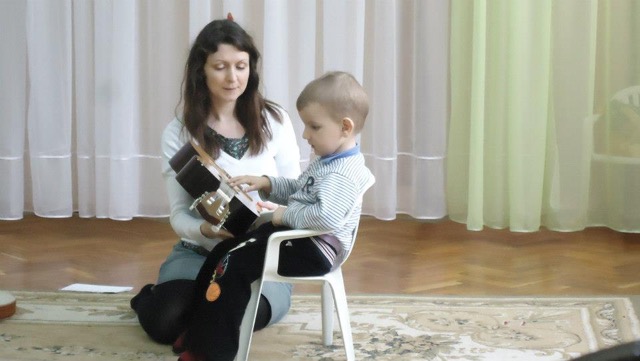Music Therapy in Moldova
Lecturer Sarah Hodkinson has just returned from Moldova, where she has been teaching music therapy to professionals from all over the country.
Moldova is considered the poorest country in Europe, having only established independence from the Soviet Union in 1991. Historically , children with severe and often mild disabilities were typically homed in institutions such as baby homes. Due to the country’s economic struggles, it was difficult for families to keep their children at home, or send their child to a mainstream school. Many government initiatives and charities are working hard to reverse this system. This involves equipping teachers and staff in kindergartens with the skills to support a child with a disability in their classroom and provide therapeutic input for the child.
The EU has given £700,000 to a 3-year project in which 40 teachers and professionals from 5 of Moldova’s regions are taught how to use “Communication Through Music.” With support from Partnership for Every Child, the British Embassy in Moldova, Healthprom and several other charities, Sarah Hodkinson has delivered training courses to 150 professionals from all over Moldova in the last 6 years. In this interview she tells us a little about her work there:
How did you get involved in the project?
Six years ago a mature student called Jane was taking the undergraduate module in Music Therapy that I teach here. Jane had been visiting Moldova for a couple of years with professional orchestral musicians who had spent some time playing music to the children in the baby homes (orphanages). Whilst looking at video clips of Music Therapy in the lectures, Jane became more and more convinced that Moldova needs Music Therapy! After she had graduated, she invited me on a trip the following winter. To cut a long story short, Moldova was not in a secure enough position financially to employ Music Therapists. Therefore we got thinking about what they did need and how we could make this happen. Through this challenge I think we’ve ended up with something even more valuable.
Where in Moldova have you been working?
Each visit I fly into Chisinau the capital of Moldova. Chisinau Airport is my favourite airport as you can land and leave the airport within 15 minutes! We have worked with charities, baby homes and kindergartens in all parts of Moldova. People travel 160km to attend our training and we make visits to their sites. The transport system and local buses are very different to those in the UK and so we’re always humbled when people travel 160km through snow to get to the training.
Some trainees even travel from Transnistria, which is part of the country that didn’t want independence from the Soviet Union in 1990 when Moldova broke free from communist Russia. Transnistria is home to 500,000 people. It has its own army that police the borders and it is not considered a very easy or safe place to travel in and out of. Whilst they consider themselves Soviet, Russia does not consider them so. Therefore this area of Moldova remains a separated rebel state.
What changes are you seeing over your repeated visits?
I’ve noticed more and more mobile phone shops appear on the high street each time I visit Chisinau!
Each time we visit we train between 30 and 50 people a day. We return each year to provide follow-up training for them in their second and third year. So we’re fortunate to be working with most professionals over a period of 3 years and sharing in the success of their work.
On my very first visit I was presented with a child in a baby home and asked to perform Music Therapy. The 5-year-old child had a significant disability, she was wheeled to me in a pram and was silent and withdrawn. As soon as I began playing my flute in time with her breathing she noticed. As we continued our music she giggled and vocalised. We had wonderful musical conversations and she led the music kicking her arms and legs about enthusiastically. When I finished, I turned to look at the director of the baby home and she had a icy stare! I was told off for stimulating a child whom she prefers to be quiet and still. Although I was pretty much escorted off the premises on this occasion, the director allowed me back the following year and we have been able to show the importance of enabling the potential in children with disabilities. Each visit, we meet more and more people who are passionate about this. From seeing Communication Through Music extracts, they are desperate to emulate this with children they work with. They are excited by what is possible through music.
Is there anything that you’ve learned about what works best for this context?
I’ve learned that music extracts are priceless. In Communication Through Music we read the child’s musical expression to get an understanding of their ability and emotional well-being. When we’re sat in a room listening to the music, we hear the same thing and the concept is understood so quickly. When we are speaking we are translated into Romanian and Russian (in Moldova they speak Romanian and Russian and rarely both). It takes us many many words to describe things that we can communicate in a few bars of music! Of course music is not a spoken language and so words are necessary in teaching this approach. So we do our best to make sure nothing is lost in translation. I’ve learned that the people are extremely kind, snow boots are essential in the winter and Moldovan food is the most delicious I’ve come across.



